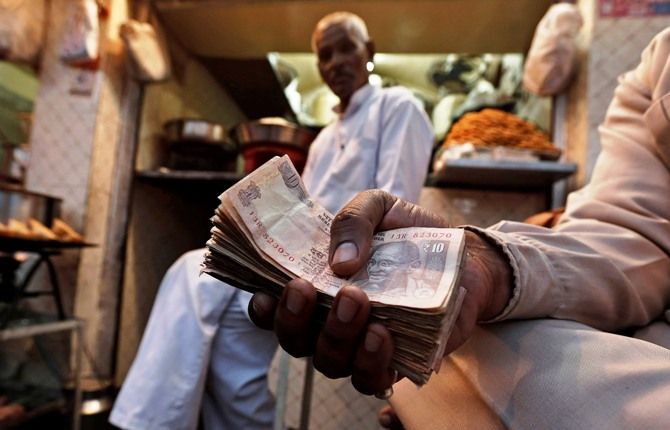Higher charges for bank account-holders and increase in insurance premiums will be things to watch out for.
 A new financial year is typically the time a lot of financial changes, either regulatory or those mandated in the Budget, get implemented.
A new financial year is typically the time a lot of financial changes, either regulatory or those mandated in the Budget, get implemented.
This year is no different. Investors need to be prepared; it will impact their finances through the year. Here are five changes coming into play in FY16:
Investments with higher interest rates
The Sukanya Samriddhi Account (SS) will earn 9.2 per cent, compared with 9.1 per cent in FY15.
Also, the rate for the Senior Citizens Savings Scheme (SCSS) will increase to 9.3 per cent from 9.2 per cent.
Those who entered SS in FY15 will benefit. However, SCSS investors will benefit only if they put in fresh money or extend the tenure of their five-year scheme by three years.
"The increase of 0.1 per cent is welcome although the quantum of increase itself should not be a deciding factor to put money into these schemes. Investors should stick to the asset allocation they had chalked out earlier," said Suresh Sadagopan, a certified financial planner.
The SS scheme offers benefit under Section 80C of the Income Tax Act and is categorised as Exempt-Exempt-Exempt (at all three stages of withdrawal). "It is a goal-based scheme and offers another alternative to those who have a girl child less than 10 years old," said Sadagopan.
Higher charges, fines for bank a/c holders
The new Reserve Bank guidelines on non-maintenance of minimum balance took effect from April 1.
"The charges will be levied only on the shortfall. For instance, if the minimum balance requirement is Rs 5,000 and if the balance falls to Rs 4,000, the penalty will be charged only on Rs 1,000 and the customer will not have to pay a flat fee or penalty," said S K V Srinivasan, executive director, IDBI Bank.
The charges will differ, based on the policy of each bank and the type of account the investor has (normal savings, premium, metro, rural, NRI, etc).
For example, the minimum monthly average balance for ICICI Bank varies from Rs 2,000 to Rs 10,000, based on whether you're classified as a rural customer, semi-urban customer or metro/urban customer.
Banks will intimate customers about the new changes through SMS or e-mail. Account-holders can also check the changes on the individual websites of banks.
"The charges will not come into effect right away. Banks will give customers enough time, say, a month, to comply with the new requirements," said Srinivasan.
Also, RBI has mandated that the balance in the savings account should not turn into a negative one solely due to levy of charges for non-maintenance of the minimum balance.
Here is a sample of some other charges applicable from April 1. HDFC Bank customers will now have to pay Rs 75 for an additional cheque book of 25 leaves per quarter.
ICICI Bank customers will have to make RTGS payment charges of Rs 25 a transaction between Rs 2 lakh and Rs 5 lakh, and Rs 50 a transaction for amounts greater than Rs 5 lakh.
Kotak Mahindra Bank will charge customers for cash deposits at branches at Rs 2.5 per Rs 1,000 of deposit.
Increased insurance premia
The higher rate of service tax from 12.36 per cent to 14 per cent will raise insurance premiums.
"The total cost for consumers will go up but the impact will be marginal," said Sanjay Datta, chief, underwriting & claims, ICICI Lombard General Insurance. Added Nayan Shah, managing director, Paramount Health Services: "Insurers are still charging older rates as the Finance Bill is yet to be passed but the new rates will be applicable soon."
 The pinch will be felt more by vehicle owners, as revised motor third-party insurance premium rates notified by the sector regulator kicked in from April 1. The premiums are set to rise by up to 30 per cent (see table).
The pinch will be felt more by vehicle owners, as revised motor third-party insurance premium rates notified by the sector regulator kicked in from April 1. The premiums are set to rise by up to 30 per cent (see table).
Higher DDT on debt MFs
Effective April 1, the surcharge to be paid on dividends in debt mutual funds will increase to 12 per cent from the earlier 10 per cent.
This means the effective dividend distribution tax will go up to 28.84 per cent from 28.33 per cent earlier, an increase of 0.5 per cent. So, debt investors will receive a lower net dividend amount.
For example, on a dividend of Rs 100, investors will now get only Rs 71.16, instead of Rs 71.67 earlier.
Relief from wealth tax
Wealthy individuals will no longer have to worry about paying wealth tax from this financial year.
Real estate investments, jewellery, cars, boats, yachts, aircraft or even cash in excess of Rs 50,000 had attracted wealth tax. "The challenge with the tax was compliance. Many people chose not to declare their wealth and even the income tax department found it difficult to do individual assessments," said Rajesh Srinivasan, partner, Deloitte, Haskins & Sells.









